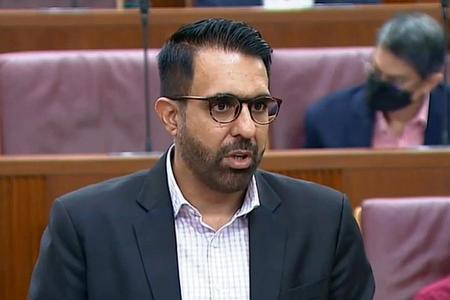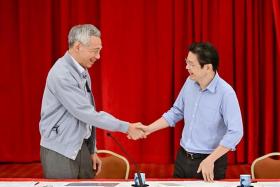WP aims to end ethnic housing policy after Singapore is race-neutral
Leader of the Opposition Pritam Singh said yesterday that his Workers' Party aims to remove the Ethnic Integration Policy (EIP) one day, but not before Singapore reaches a state of being race-neutral, when such initiatives will no longer be needed.
He was speaking towards the end of a 30-minute debate with National Development Minister Desmond Lee on the policy, which sets quotas for flats owned by each racial group in a block or precinct.
Their exchange, which saw question time in Parliament extended by more than an hour, also drew comments from Leader of the House Indranee Rajah and later, Senior Minister Teo Chee Hean.
Mr Lee said: "In 2006 and all the way till last year, WP's position is that we have already reached a level of multiculturalism; and therefore unequivocally called… for the immediate abolition of EIP.
"The Workers Party's position today... is that we still need the EIP (as) we work towards a race-blind society, and we endeavour to reach there and at some point hopefully, we'll not need the EIP. So that is a clear change in political position."
Mr Lee called on Mr Singh, who is WP chief, to clarify the party's stance today.
"Is it your position that there won't be racial concentrations if we abolish the EIP?" the minister asked.
Mr Singh said his call for the EIP to be revisited and reviewed was in the context of - but not limited to - five points.
First, a larger national conversation on race relations in Singapore and what it means to be Singaporean.
Second, the effect of immigration into Singapore, leading to families in Housing Board flats that fall outside of the traditional Chinese, Malay, Indian and Other (CMIO) model of ethnic classification.
Third, the experience and impact of mixed marriages.
Fourth, the economic loss to minorities who have to lower the market price of their flats due to the EIP.
And fifth, a reassessment of Singapore's lived experiences which acknowledges policies and guidelines that have successfully encouraged racial integration, such as national schools, anti-discrimination guidelines at the workplace and National Service among others; and how these compare with the EIP.
"The current policy as it stands has a larger impact on minorities, penalising them in the pocket when they have to sell their flat," said Mr Singh.
"By minorities, I mean not just racial minorities (but) those who are affected by it, including Chinese, Malays... and this may perversely interact with the stated objective of the policy of racial harmony, thereby breeding resentment among those who are affected by the policy.
"The EIP quotas should either be further loosened to ameliorate the prospects of further economic loss for sellers, with HDB committed to buying back the affected flat at the evaluation price - or a larger geographical area representing the anchor for the EIP, rather than the precinct and block quotas."
Mr Lee accepted that the EIP could cause some degree of pain and unhappiness.
"We address that through appeals, we look at and scrutinise very carefully to help the affected seller," he said. "Bearing in mind that we have to be very judicious, otherwise the lessons that we've learnt will all unravel."
In response, Mr Singh said: "Beyond these cases where HDB looks at it on a case-by-case basis, we have a rental housing regime where HDB is prepared to administratively lift block limits. So it's not as if... the arguments that were made by the Minister of National Development are cast in stone. There is flexibility beyond looking at individual cases and moving the boundaries... What sort of schemes, changes has HDB discussed internally?"
Mr Lee said these were important details, but secondary to fundamental questions of the WP's position on multiracialism, bulwarks such as the EIP, and the CMIO model.
At this point, Ms Indranee stepped in to press Mr Singh to clarify whether he was calling for the EIP to be abolished.
"Is the answer to that yes or no, that's all I want to know. Or is he saying that it need not be abolished; we can just look to see how we improve it?" she said.
Mr Singh replied: "That's a very nice way to close off a discussion on a topic."
Get The New Paper on your phone with the free TNP app. Download from the Apple App Store or Google Play Store now




